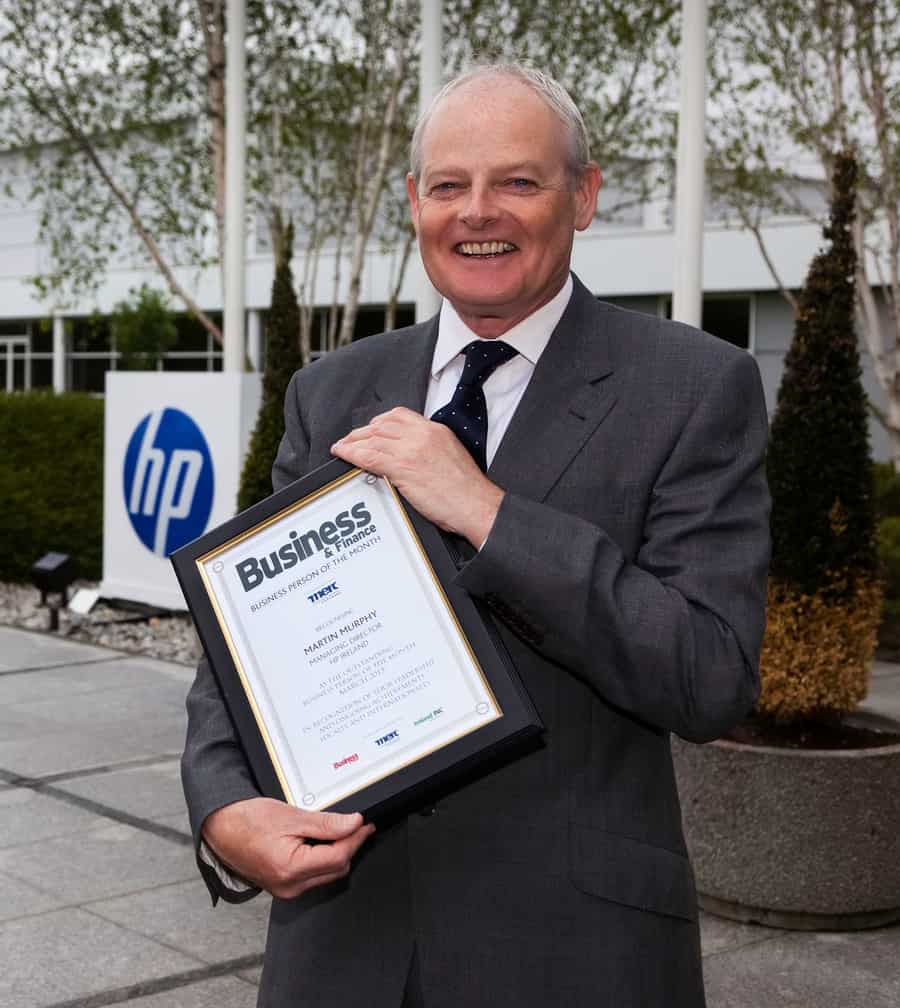Martin Murphy tells Niamh Mac Sweeney about HP’s latest investment in Ireland, and technology that will enable organisations to build, manage and consume workloads in hybrid environments.
Q: Tell me about HP’s latest investment at Ballybrit in Galway?
A: The new HP facility at Ballybrit will be dedicated to software research and development, cloud technology and business services.
When completed next year, Ballybrit will be a Centre of Excellence for HP cloud services globally. For example — the HP Cloud Research and Development (R&D) team in Galway play a large role in delivering HP’s public cloud — one of the largest OpenStack-based public clouds in the world. The team will continue in this role as it focuses on building the HP Helion portfolio of cloud products and services, also based on OpenStack technology — as well as Cloud Foundry — and designed to enable organisations to build, manage and consume workloads in hybrid IT environments.
Q: What are your main priorities and goals in your role as managing director of HP Ireland?
A: My key objective is to continue to drive HP’s business in the market by helping our customers — consumers, small businesses, large enterprise and public sector — take advantage of technology in their home and working lives.
This is an incredibly exciting market place where you need to constantly innovate to deliver value. By growing our business, we will continue to create value for our customers, for our employees and for Ireland. I also want to continue to deepen HP’s roots in Ireland and to establish a Campus Hub for HP in Europe.
I want Ireland to be the ‘go to’ place for HP investments — because what we do here is at the cutting edge, and because the people we have are among the best in the global organisation.
We are innovating and globalising from our Irish base and we have enhanced Ireland’s status within the organisation. We want to continue to win new investments and new jobs for HP Ireland.
Q: What approach and leadership style do you bring to your role at HP?
A: I’m a firm believer in ‘what gets measured, gets done’ so my approach is always results orientated.
I also believe in building strong teams, which is essential in our industry and in today’s increasingly collaborative workplace.
When it comes to achieving organisational goals, it is important to be able to bring people with you. This can be achieved by articulating the end point, or what the desired outcome is, and then setting people free to innovate, experiment and take calculated risks. When you have great people as we do, this approach always leads to the best results.
Q: In the tech industry, how is Ireland performing?
A: The ICT industry in Ireland is buoyant at present — there is a steady stream of inward investment from technology companies and Ireland is recognised as one of the foremost locations for IT investment globally.
There is significant potential for continued growth of the sector in Ireland in 2014.
At the start of 2012, there were up to 5,000 ICT positions to be filled and this was hindering our ability to expand and attract new investments.
Today, there continues to be a strong demand for graduates in the computer science and software development areas and we need to increase the national output of science and engineering graduates.
HP is fortunate in that it has been successful in attracting the right graduates with the skills required. However we must keep a steady flow of graduates with these skills.
Q: How is HP performing and how important is Ireland to its global operations?
A: In recent years, we have transformed HP’s Irish business from one that was largely product driven, into a services and consulting business.
We have grown our market share and we are one of the largest providers in the market today. Our customer base covers Ireland and Northern Ireland and the spectrum of businesses ranges from consumer to SMB to large enterprise and public sector.
We’ve worked hard at staying close to our customers and that has really stood to us.
I want Ireland to be the ‘go to’ place for HP investments — because what we do here is at the cutting edge, and because the people we have are among the best in the global organisation.”
Ireland has been the recipient of a number of important investments from HP globally in recent years — in the past 12 months alone, we have opened a new facility in Belfast, which incorporates the European R&D Centre of Engineering Excellence.
We have doubled the number of NI engineering teams that are currently developing ground-breaking cloud-based software for HP’s industry leading storage products.
Our investment in the new R&D facility in Ballybrit, Galway comes as a direct result of the launch of HP Helion earlier this year, representing a global investment of more than $1bn to support and deliver new open source cloud products and platforms around the world.
Q: Why is HP continuing to invest in Ireland?
A: There are a number of factors that make Ireland a highly attractive investment location — at a macro level, Ireland’s young population, decades of investment in education, a national hunger for enterprise, an export driven economy and the successful promotion of Ireland as a business-friendly environment, are all factors which have helped us successfully make the case for locating global investment here.
What has also helped in recent years, is that Ireland has regained lost competitiveness, although more needs to be done on this. This is always a significant consideration for multinationals considering investing here.
We will continue to grow and develop our Irish business and expect that Ireland will continue to be at the forefront of some HP’s most innovative developments worldwide.
Q: In your opinion, are employers finding any skills gaps in the market?
A: There is no doubt that there are skills gaps in certain areas of the economy — one recent study suggests that over 70% of employers are concerned the skills gap will impact their ability to grow business. The main occupations experiencing skills shortages include software developers, project managers and engineers.
We need to build skills and competencies that enable us to provide solutions to our customers that encompass the opportunities delivered by cloud, mobility, security and big data.
Getting education and skills right is core to investment and job creation. Ireland also needs a modern education curriculum that embraces a stronger emphasis on maths, science and related technical competencies.
HP is part of a number of initiatives which aim to contribute to this, including the Smart Futures programme aimed at educating young people on STEM careers and Digital Schools of Distinction, an initiative which helps primary schools to maximise the potential of ICT in the classroom.
Q: In addition to your role with HP, you have also just recently been appointed president of Dublin Chamber of Commerce — since taking up this role what have been the key opinions and sentiment of local business?
A: Business sentiment has undoubtedly improved in the last six months. At a macro level, this has been driven by a number of positive indicators including Ireland’s exit from the Troika bailout programme at the end of 2013, a return to international financial markets, the fall in long-term bond rates and an improvement in Ireland’s international credit ratings.
That said, businesses are still grappling with a very challenging business environment.
Access to finance remains a very pressing issue for many businesses; we need to develop more non-bank sources of finance for SMEs to compliment the traditional bank overdraft that covers working capital. The Government’s recent initiative, the new Strategic Banking Corporation of Ireland, is a welcome step to help address this issue.
Rising costs are also an issue for businesses — from utilities including the new water charges, to upward pressure on wages.
The areas that I will be drawing attention to during my tenure as president of the Chamber include — the need to reduce the cost of doing business generally, and specifically, the cost of hiring; better availability of capital and financing; getting back to a functioning banking system and doing more for start-ups.






